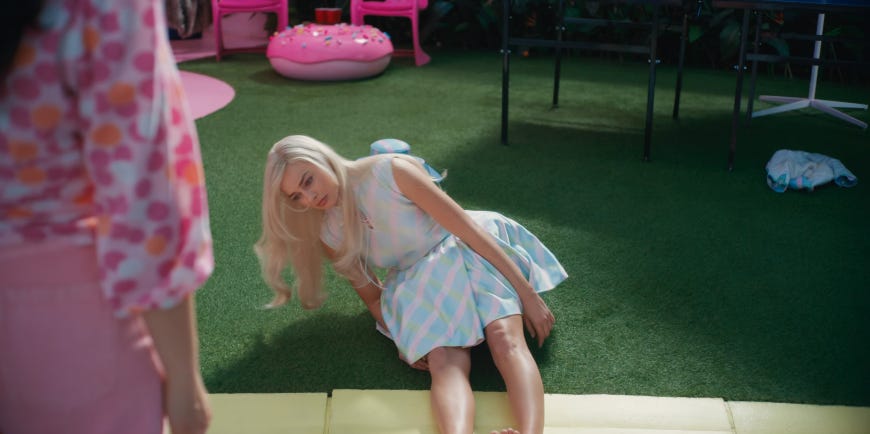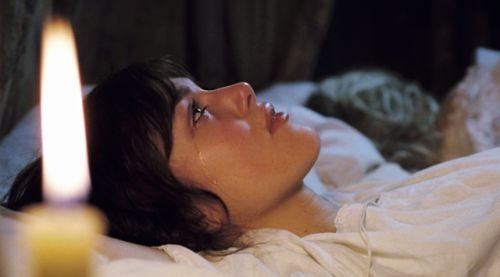Depression Barbie: Watching Pride and Prejudice as a Coping Mechanism
On depression, Greta Gerwig's psychic powers, and the power of a portable DVD player.
I had a different essay planned to post next. I’ve been working on it for weeks, carefully gathering sources and scribbling my thoughts in a notebook or frantically typing them out in my notes app. The problem and the reason that I have yet to finish and post it, is that- to be frank- I’m depressed.
It’s not a new sensation for me by any means, and I can do most things normally while going through a depressive episode at this stage in my life. However, this iteration of an old illness came with teeth, and I’ve found myself in a darkness I haven’t been this familiar with in over a decade. For several weeks now, I’ve been picking through the worst parts of my psyche, lifting things up and sniffing them like I’m running out of laundry (which, of course, I am). Every thought is sluggish, every action seems to require a kind of Herculean effort, every line that I write feels stupid and disjointed and leads me into an existential spiral that spins me round and round until I’m tunnelling into the dirt under my feet like some sort of mentally ill cartoon character.
Then, like the rest of the world, I watched the Barbie movie.
The Barbie movie is a rich narrative that deserves thoughtful analysis, but I mostly just want to talk about one scene, and that is the commercial that appears when Margot Robbie’s Barbie is going through an existential crisis. The events taking place in Barbie World start to affect what is happening in the Real World, which leads to a new Barbie being launched by Mattel; Depression Barbie.
Depression Barbie wears sweatpants all day and doom-scrolls through her estranged friend’s engagement photos on Instagram but the real kicker comes when we see that Depression Barbie is watching the BBC’s 1995 production of Pride and Prejudice. Depression Barbie has watched it seven times, and will fall asleep doing so, after eating a family pack of Starburst.
When this scene unfolded in the theater, my best friend and I stared at each other, open-mouthed, as we saw Colin Firth’s face on Depression Barbie’s tiny screen. It was patently unfair to be called out in such a brutal manner, in public, during the Barbie movie. How did Greta Gerwig know?
The reactions to this particular scene have been extremely similar to ours, with social media exploding with memes about Depression Barbie’s Pride and Prejudice “joke”. I put joke in quotes because, while it was humorous, it didn’t feel like a joke. It felt like looking into a mirror and seeing my darkest demons reflected there, only to have the demon say, “this you?”. Greta Gerwig knew my personal depression coping mechanism because, well, it’s common. I’m not special.
I first received a diagnosis for my depression the summer I turned sixteen years old. I had started having debilitating panic attacks about a month or so before the end of the school year, resulting in trips to the pediatrician, a neurologist, a psychiatrist, and a therapist. Suddenly I had a medical team that included several men in glasses and sweater vests peering at me over clipboards asking me if I ever thought about death. They prescribed medications with names I couldn’t pronounce, and my mom would dole them out to me every morning, little orange bottles lined up on a shelf in the kitchen. I couldn’t get through a day without symptoms such as hyperventilating, chest pain, blurry vision, dizziness, and headaches. I was terrified of having an attack in public, horribly embarrassed every time the world would go sideways, and my breath would leave me. It got so bad that I was afraid to leave the house. So I didn’t. I spent my days holed up in my bedroom, wearing the same shorts and tank top day in and day out. I couldn’t read anymore without the words slipping around in my head, couldn’t concentrate on anything new. I oscillated back and forth between wanting to feel something and wanting to feel nothing. When I felt numb and empty and wanted to feel something, I watched endless CSI marathons on a men’s cable TV network and reveled in fictional violence in the middle of a weekday. When I wanted to feel nothing, when my thoughts were too loud and my skin crawled and everything was just… too much? I watched Pride and Prejudice.
My adaptation of choice was the 2005 version with Keira Knightley as Elizabeth Bennet. I would open my clunky portable DVD player that I had saved up my allowance to buy for myself and slot the well-used DVD into the player. It would whir and whir and finally, out of the tinny speakers, I’d hear birdsong and the first few hopeful notes of piano. I’d sink into my pillows, player balanced on my stomach, and for two hours and eight minutes, I could silence the wrongness I felt clawing up my throat. I watched it every day.
That was in 2007, before smartphones, before the ubiquity of social media, before I found a community on tumblr (that’s a story for another time). I didn’t know then that I was not alone in my emptiness, not alone in my habits, not alone in experiencing the soothing power of Pride and Prejudice. I didn’t know how to share these experiences because I felt alienated from my peers. I finished that school year with a tutor who brought my schoolwork to me, as the school decided it was best if I wasn’t in class- I was a disruption. I had three friends, and I saw them rarely that summer, fearing their reactions when I would inevitably have a panic attack halfway through hanging out, even if all we were doing was sitting in someone’s basement, eating ice pops and watching America’s Next Top Model. I needed to find other ways to feel understood, like I wasn’t crazy.
I can’t speak directly to why the 1995 Colin Firth version of Pride and Prejudice might be Depression Barbie’s go-to (though I have watched it many times), but in scrolling tiktok and seeing dozens of videos about the Depression Barbie scene, I can tell you that I’m not alone in using the 2005 version as my medicine. My For You page was filled with young women all expressing the same sentiment- Barbie called them out, but if they were Depression Barbie, it would be Matthew MacFadyen’s Darcy on their screens, not Colin Firth.
It makes sense- the 2005, Joe Wright directed adaptation of Pride and Prejudice is far moodier. In Austen’s time, a girl wouldn’t have been diagnosed with depression, but she would have experienced “melancholia”. Characters around her might note that she seemed to have lost her “bloom”, or even, in some cases, it might be said that she looked “sickly”. We see Keira Knightley’s Elizabeth floating through her own melancholy, as she spins endlessly on her wooden swing, the world passing by her as the constants in her world are pulled away. She stomps across the moors, certain of herself one minute, then stands motionless in front of a mirror in her chemise and robe for hours as the light slips away, beautiful in her mental anguish.
My mental anguish has never been that aesthetically pleasing. Battles with myself, episodes that take me to the edge, those are often characterized by greasy hair, puffy eyes, and a grayish tint to my skin. I wear the same stained sweatpants as Depression Barbie and what my mother once referred to as my “Schlumphy Breakup Sweater” (it’s an old sweater of my dad’s that is covered in bleach stains, unravelling at the neck and wrists, and was what I wore for 3 straight days after a particularly gnarly breakup). Pride and Prejudice brings back some of the dignity lost in times when I can barely summon the energy to put on mascara (even though it’s the waterproof kind that costs $30).
By now, I’ve seen Pride and Prejudice so many times I can quote it from start to finish with zero prompting. It’s not the way out of the cave, but it provides a helpful raft as I float around in the dark. Greta Gerwig’s Barbie provided the same kind of support. Watching Barbie fall apart, hearing her voice the same things that have been running through my mind (I’m not a doctor or a scientist, I’m not a Nobel Prize winner, I don’t even have a job, I’m not good enough, pretty enough, etc, etc), I saw that mirror again, with the demons all in pink this time. Barbie offers no magic solutions, no permanent way out of the spiral, but it does provide reminders that we are not alone in these feelings, and that we have resources- flashing lights in the darkness to guide us along.
The other day, I confessed to my roommate how poorly I’ve been doing. She made me breakfast, took me thrift shopping, and taught me her favorite card game. She took gentle care to help pull me out of the spiral, even while I felt like Lizzie Bennet on her swing. Then another friend drove us to the beach to watch the sunset.
The moon rose among the clouds in a sky that bled lavender, periwinkle, turquoise, and violet. The water turned silvery and the whole world was pink and purple and sparkling, and I heard Barbie’s Heartsong.
For the film, Billie Eilish wrote a song called “What Was I Made For?”, and I’ve had it on repeat for about a week. In the song, she sings in a beautiful whisper “I don't know how to feel/But I wanna try/I don't know how to feel/But someday I might”. Staring out at the sky reflected in the damp sand, a slippery chrome spill of purples, I reminded myself that my feelings aren’t facts, that I can be so much more than the lies my brain has told me about who I am. “Think I forgot how to be happy/Something I'm not, but something I can be/Something I wait for/Something I'm made for”. I’ve made it out before. I can do it again.







You're courageous. And a damn good writer.
❤️❤️❤️